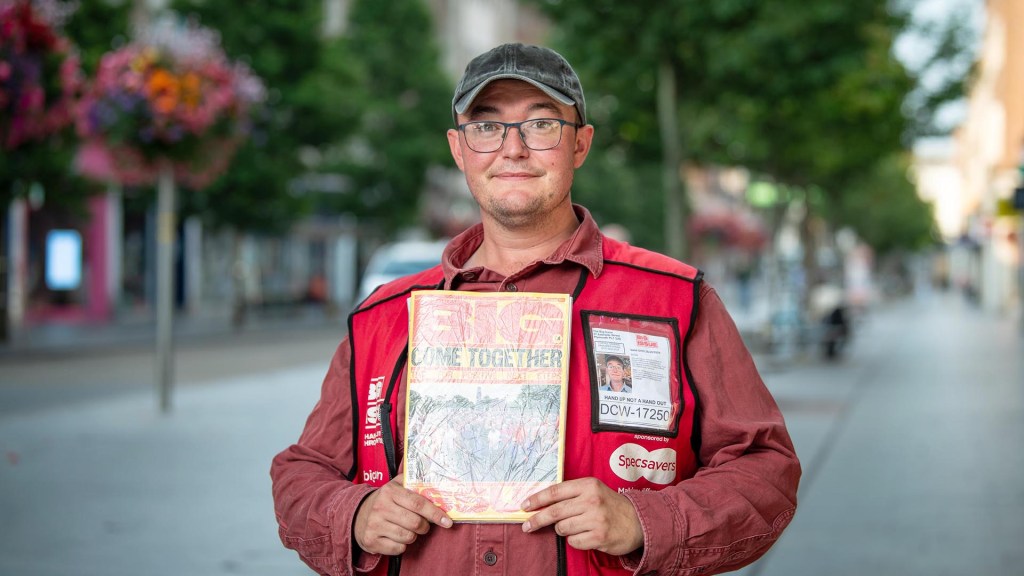Josh Eardley, Boots, High Street, Exeter
Josh studied biotechnology at university and was published three times, but funding was always hard to find
Image: Exposure Photo Agency
The reason why I like the job is the flexible hours. It allows me to engage with volunteering so I can sell the magazine around that. I did a BTEC in health and social care, so I’ve been spending a lot more time with elderly people just in a friendship capacity through meeting them, having drinks in the pub, time in the library, having coffee.
It’s enabling me to make a friendship base that is allowing me to be able to use other parts of my CV, which ultimately might be a sustainable route forward for me. Through the Exeter CoLab wellbeing hub I’ve met quite a lot of people who are also affected by homelessness. I think it’s important that Big Issue is striving to mitigate homelessness in the elderly population.
I became homeless last spring. During that period, I relied on all the homelessness services. I was living in a tent in the Exeter area and I consistently moved around for safety purposes. That went on for a period of about four months and then I had about seven weeks staying in one of the homelessness pods.
Get the latest news and insight into how the Big Issue magazine is made by signing up for the Inside Big Issue newsletter
Fortunately, I saw the end of it and became housed and started selling the Big Issue through a referral. My friend at Petrock’s [local independent homelessness charity] recommended that I would be good for the role. It turned out to be a very good thing for me to have started.
I’ve been selling the magazine for 11 months. Since I’ve transitioned to the Boots pitch, things have picked up drastically. Before it was quite slow and I had to put quite a lot of effort and energy into building a regular customer base to make it a viable endeavour. Fortunately, that happened for me.
I overcame difficulties and adversity through perseverance, demonstrating resilience and hopefully bringing value to Big Issue. I’ve always been able to convey effectively to the customer what the story is [in the magazine] that week and how it relates to me. It’s been fun. It’s been tricky.
I came from a single-parent background and I was homeless when I was younger. Despite that, I still managed to get through college and go to university in 2012. But my financial resilience was much lower than most of my peers and that was pretty much the story the whole way through. However many casual hours I’d have alongside studies, the scenario didn’t really improve and the high cost of borrowing meant I was really racking up debt.
There wasn’t really much there for me after the academic period. I had a couple of glimpses at £30,000 a year for six months but that still didn’t buffer my accounts. I wasn’t really able to get a stable non-academic role or something relating to my university qualifications in biotechnology. So, unfortunately, I became homeless once again.
I moved to Exeter to work in the Covid labs as part of test and trace. My university experiences were with molecular biology. I got my degree and I was published three times but funding was always the problem.
For me, the future is about finding a sustainable route forward. Big Issue is definitely helping me to mobilise parts of my CV. I’ve just got to make something of it and hope there’s an opportunity to grasp as I continue with Big Issue. Obviously, it would help me if I didn’t become homeless again, which is always an ongoing matter. I’m clinging on with all my might at the minute to pay the service charge for the rent. At the moment, the only route forward is to be at the pitch.
I’d love to become self-employed as a sole trader of some kind. I’d like to think I could return to university to do more research on biotechnology supply chains. Looking at circular economy research and mitigating future inflationary pressure, sustainable economics etc. There are some good conversations to be had outside of Boots!
Words: Liam Geraghty
Boots, High Street, Exeter, UK

